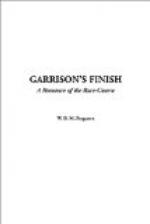Garrison, stung to madness by retrospect, humped his way through the crowd at the gates of the Aqueduct. There was not a friendly eye in that crowd. He stuffed his ears with indifference. He would not bear their remarks as they recognized him. He summoned all his nerve to look them in the face unflinchingly—that nerve that had been frayed to ribbons.
And then he heard quick footsteps behind him; a hand was laid heavily on his shoulder, and he was twisted about like a chip. It was his stable owner, his face flushed with passion and drink. Waterbury was stingy of cash, but not of words.
“I’ve looked for you,” he whipped out venomously, his large hands ravenous for something to rend. “Now I’ve caught you. Who was in with you on that dirty deal? Answer, you cur! Spit it out before the crowd. Was it me? Was it me?” he reiterated in a frenzy, taking a step forward for each word, his bad grammar coming equally to the fore.
The crowd surged back. Owner and jockey were face to face. “When thieves fall out!” they thought; and they waited for the fun. Something was due them. It came in a flash. Waterbury shot out his big fist, and little Garrison thumped on the turf with a bang, a thin streamer of blood threading its way down his gray-white face.
“You miserable little whelp!” howled his owner. “You’ve dishonored me. You threw that race, damn you! That’s what I get for giving you a chance when you couldn’t get a mount anywhere.” His long pent-up venom was unleashed. “You threw it. You’ve tried to make me party to your dirty work—me, me, me!”—he thumped his heaving chest. “But you can’t heap your filth on me. I’m done with you. You’re a thief, a cur—”
“Hold on,” cut in Garrison. He had risen slowly, and was dabbing furtively at his nose with a silk red-and-blue handkerchief—the Waterbury colors.
“Just a minute,” he added, striving to keep his voice from sliding the scale. He was horribly calm, but his gray eyes were quivering as was his lip. “I didn’t throw it. I—I didn’t throw it. I was sick. I—I’ve been sick. I—I——” Then, for he was only a boy with a man’s burdens, his lip began to quiver pitifully; his voice shrilled out and his words came tumbling forth like lava; striving to make up by passion and reiteration what they lacked in logic and coherency. “I’m not a thief. I’m not. I’m honest. I don’t know how it happened. Everything became a blur in the stretch. You—you’ve called me a liar, Mr. Waterbury. You’ve called me a thief. You struck me. I know you can lick me,” he shrilled. “I’m dishonored—down and out. I know you can lick me, but, by the Lord, you’ll do it here and now! You’ll fight me. I don’t like you. I never liked you. I don’t like your face. I don’t like your hat, and here’s your damn colors in your face.” He fiercely crumpled the silk handkerchief and pushed it swiftly into Waterbury’s glowering eye.
Instantly there was a mix-up. The crowd was blood-hungry. They had paid for sport of some kind. There would be no crooked work in this deal. Lustfully they watched. Then the inequality of the boy and the man was at length borne in on them, and it roused their stagnant sense of fair play.




